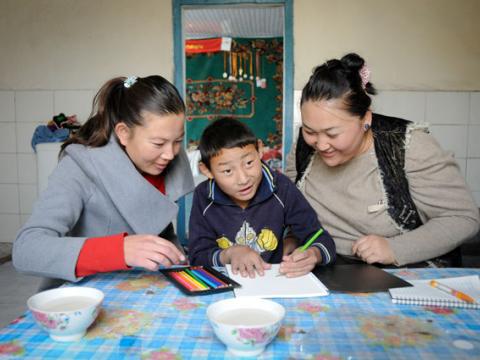Boy with disability learns how to communicate

“He was always falling down and angry. He broke notebooks, books. He could not understand,” painfully shares 16 year-old Herzaya, glancing at her younger brother. Otgonsaykhan, 12, suffers from cerebral palsy.
Herzaya and Otgonsaykhan have five siblings and live in Bayan-Ulgii, a mountainous and windy place in the extreme west of Mongolia.
Otgonsaykhan scampers to pour milk tea, a traditional Mongolian drink made with hot tea, milk and salt. With a broad grin, Otgonsaykhan communicates with his hands.
The white walls of the family’s home are cracked and stained yellow. The cabinets are old and scuffed. But as brother and sister settle in close, their bond fills the room with warmth. Herzaya’s cheeks rosy, she relates Otgonsaykhan’s story.
Life is very difficult for the family of nine. The father, Sumbazar, is unemployed. The mother, Enkhtsetseg, and older brothers, work in the seasonal construction industry. When jobs are few, especially in the harsh winters, the family suffers from shortage of food and other basic items.
Otgonsaykhan’s disability put financial and emotional strain on the household. His severe bouts of rage scared his siblings and frequent seizures endangered his life. Each seizure was a trip to the emergency room.
Enkhtsetseg requested support from local administration but to no avail. Enkhtsetseg feared for Otgonsaykhan’s future, believing his next seizure could be his last. Otgonsaykhan’s inability to communicate left the child helpless. He could never have a normal life.
In 2007, Otgonsaykhan became involved in World Vision’s sponsorship programme. Soon after, his life began to change.
One percent of Bayan-Ulgii’s population is disabled, but until 2008 people with disabilities travelled to the capital city of Ulaanbaatar to receive treatment.
In 2008, World Vision supported the establishment of a Centre for Disabled Children by donating 40 percent of the funds needed for start-up. A total of 600 disabled children have now been treated at this centre.
Among the rehabilitation techniques is the use of non-formal education, helping children re-socialise and learn how to communicate.
Before attending this centre, Otgonsaykhan was angry because he could not communicate. Today, he uses body language and can articulate simple words such as father, mother and sister. He loves attending the centre, especially spending time with other children.
“I am very happy my brother uses body language,” Herzaya shares, a soft smile playing on her lips. “If his teeth hurt, he can communicate,” she adds.
Otgonsaykhan even signals to his mother when the news is coming on.
Herzaya watches proudly as World Vision employees help Otgonsaykhan trace his hand. She relates that when Otgonsaykhan received letters from his sponsor, their mother feared he would rip them up. Instead, Otgonsaykhan placed them against his heart.
Although Otgonsaykhan still suffers from seizures, they are much less frequent. His brother Batsaikhan, 23, recently graduated with a nursing degree and helps tend to Otgonsaykhan’s health needs.
“World Vision is a beautiful organisation, it helps disabled children,” Herzaya conveys. Otgonsaykhan may not be like other children, but his life now has new meaning.